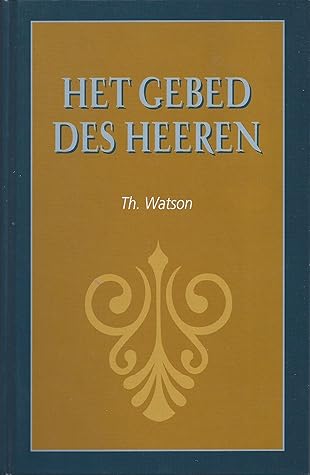- Bible
- Read the Bible
- Bible Versions
- Verse of the Day
- Reading Plans
- Verses by Topic
- Books of the Bible
- Bible Images
- Study
- Commentaries
- Concordances
- Dictionaries
- Encyclopedias
- Sermons
- Bible Atlas & Maps
- BP Wiki
- Devotionals
- Today's Devotionals
- Light of the World
- All Devotionals
- Inspirational Quotes
- More
- Picture Quotes
- Videos
- Inspirational
- Bible Study
- What The Bible Says
- Bible Q&As
- Daily Bread
- Bible by Genre
- Bible Stories
- Random Bible Verse
- Community
- Store
Het Gebed des Heeren
by Thomas Watson
'Het gebed des Heeren' is een vertaling van 'The Lords's Prayer' van Thomas Watson.
Dit is het derde deel van de gehele geloofsleer, die Watson in leerdiensten heeft behandeld aan de hand van de Westminster Confession.
Deel I "Body of Divinity" (Hoofdsom van de Geloofsleer);
deel II "The Ten Commandments" (De Tien Geboden) en
deel III "The Lord's Prayer" (Het Gebed des Heeren).
De structuur van Watsons werken is heel doorzichtig. Dit komt ook uit in de verklaring van de zes beden van het Onze Vader. Na een heldere analyse van de tekst volgen de gebruikelijke "uses" (toepassingen), waarin hij nader onderwijs geeft, vermaant, het ware van het valse onderscheidt en vertroost.
Vooral in de zesde bede komt de zielenherder naar voren. Met grote kennis van zaken geeft Watson allerlei raadgevingen aan zielen die onder een of andere verzoeking verkeren. Als een echte puritein diept hij dit onderwerp tot in de finesses uit. Door zijn vele voorbeelden en vooral ook door zijn puntige uitspraken reikt Watson een overvloed van stof tot nadenken aan. Iemand heeft eens gezegd: "Wie enkele bladzijden van Watson heeft gelezen, heeft voldoende materiaal voor een catechisaties of voor een preek".
Dit is het derde deel van de gehele geloofsleer, die Watson in leerdiensten heeft behandeld aan de hand van de Westminster Confession.
Deel I "Body of Divinity" (Hoofdsom van de Geloofsleer);
deel II "The Ten Commandments" (De Tien Geboden) en
deel III "The Lord's Prayer" (Het Gebed des Heeren).
De structuur van Watsons werken is heel doorzichtig. Dit komt ook uit in de verklaring van de zes beden van het Onze Vader. Na een heldere analyse van de tekst volgen de gebruikelijke "uses" (toepassingen), waarin hij nader onderwijs geeft, vermaant, het ware van het valse onderscheidt en vertroost.
Vooral in de zesde bede komt de zielenherder naar voren. Met grote kennis van zaken geeft Watson allerlei raadgevingen aan zielen die onder een of andere verzoeking verkeren. Als een echte puritein diept hij dit onderwerp tot in de finesses uit. Door zijn vele voorbeelden en vooral ook door zijn puntige uitspraken reikt Watson een overvloed van stof tot nadenken aan. Iemand heeft eens gezegd: "Wie enkele bladzijden van Watson heeft gelezen, heeft voldoende materiaal voor een catechisaties of voor een preek".
BUY NOW
Hardcover, 454 pages
Published 1999 by Gebr. Koster
© 2025 Bibleportal.com All rights reserved.

He was educated at Emmanuel College, Cambridge, where he was noted for remarkably intense study. In 1646 he commenced a sixteen year pastorate at St. Stephen's, Walbrook. He showed strong Presbyterian views during the civil war, with, however, an attachment to the king, and in 1651 he was imprisoned briefly with some other ministers for his share in Christopher Love's plot to recall Charles II of England.
He was released on 30 June 1652, and was formally reinstated as vicar of St. Stephen's Walbrook. He obtained great fame and popularity as a preacher until the Restoration, when he was ejected for nonconformity. Not withstanding the rigor of the acts against dissenters, Watson continued to exercise his ministry privately as he found opportunity. Upon the Declaration of Indulgence in 1672 he obtained a license to preach at the great hall in Crosby House. After preaching there for several years, his health gave way, and he retired to Barnston, Essex, where he died suddenly while praying in secret. He was buried on 28 July 1686.
Thomas Watson was an English, non-conformist, Puritan preacher and author.
He was educated at Emmanuel College, Cambridge, where he was noted for remarkably intense study. In 1646 he commenced a sixteen year pastorate at St. Stephen's, Walbrook. He showed strong Presbyterian views during the civil war, with, however, an attachment to the king, and in 1651 he was imprisoned briefly with some other ministers for his share in Christopher Love's plot to recall Charles II of England.
He was released on 30 June 1652, and was formally reinstated as vicar of St. Stephen's Walbrook. He obtained great fame and popularity as a preacher until the Restoration, when he was ejected for nonconformity. Not withstanding the rigor of the acts against dissenters, Watson continued to exercise his ministry privately as he found opportunity. Upon the Declaration of Indulgence in 1672 he obtained a license to preach at the great hall in Crosby House. After preaching there for several years, his health gave way, and he retired to Barnston, Essex, where he died suddenly while praying in secret. He was buried on 28 July 1686.
... Show more